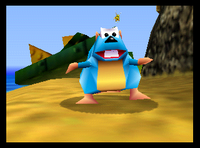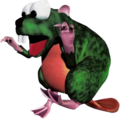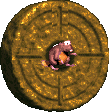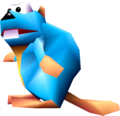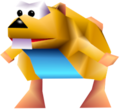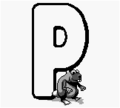Gnawty
- "Beaver" redirects here. For the characters from Virtual Boy Wario Land, see Beaver (Virtual Boy Wario Land).
| Gnawty | |||
|---|---|---|---|
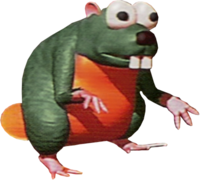 Artwork of a Gnawty from Donkey Kong Country | |||
| First appearance | Donkey Kong Country (1994) | ||
| Latest appearance | Donkey Kong Country (GBA) (2003) | ||
| |||
| |||
| |||
Gnawties, sometimes referred to as Gnawty Beavers,[1][2] are lazy-eyed beavers and basic enemies who first appear in Donkey Kong Country. Their name is a pun on the words "gnaw" and "naughty". In Donkey Kong Country, Gnawties had a green gray fur, and would later be recolored to light blue starting in Donkey Kong 64. However, the Gnawty appearing on the original box art of Donkey Kong Country is a blue gray color.
Neeks and Sneeks from Donkey Kong Country 2: Diddy's Kong Quest and Donkey Kong Country 3: Dixie Kong's Double Trouble!, respectively, display the same behavior and weaknesses as Gnawties. This is also the case for Awks from Donkey Kong Country Returns and Dozies from Donkey Kong Country: Tropical Freeze.
History
Donkey Kong Country
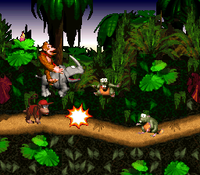
In Donkey Kong Country, Gnawties are one of the weakest enemies encountered by Donkey Kong and Diddy Kong on their journey, as they can be defeated from any attack, including being jumped on, rolled into, or having a barrel thrown at it. Gnawties have a brown-fur variant that moves around while standing in the center hole of a millstone, somewhat similar to the functionality of a hamster wheel. They only appear in two temple-themed levels, Millstone Mayhem and Temple Tempest. In contrast to regular Gnawties, this variant cannot be defeated because millstones are indestructible. The millstone-riding Gnawties in Millstone Mayhem move back and forth on a set path, while the ones in Temple Tempest chase the Kongs down a path until they hit into a dead-end wall. Additionally, two of the game's bosses are Gnawties, Very Gnawty and Really Gnawty, both of whom require more hits to defeat than a regular Gnawty and move around by hopping instead of walking. Very Gnawty is green gray and Really Gnawty is brown, reflecting the colors of both types of Gnawties.
Gnawties are differently colored in each remake. In the Game Boy Color version, the regular Gnawties have a grayish-green color (with one appearing standard green in the end credits), and the millstone-riding variant is red. Additionally, the millstone-riding Gnawties stand on top of the millstone rather than in the center. In the Game Boy Advance version, all Gnawties have a blueish color, including the millstone-riding variant, and the colors of Very Gnawty and Really Gnawty were swapped, with the latter now having a blueish color.
Gnawties appear in the following levels:
- Jungle Hijinxs
- Winky's Walkway
- Millstone Mayhem (on millstone)
- Tree Top Town
- Temple Tempest (regular and on millstone)
- Snow Barrel Blast
- Oil Drum Alley
- Trick Track Trek
- Mine Cart Madness
- Tanked Up Trouble
- Manic Mincers
- Misty Mine
- Platform Perils
Donkey Kong Land
Gnawties, called Batty Rats,[3] make their second appearance in Donkey Kong Land, which only features the walking variant. They are still vulnerable to any of the Kongs' attacks.
Gnawties are very common, and they appear in most of the levels, as follows:
- Freezing Fun
- Simian Swing
- Deck Trek
- Rope Ravine
- Congo Carnage
- Arctic Barrel Arsenal
- Tricky Temple
- Snake Charmer's Challenge
- Mountain Mayhem
- Track Attack
- Sky High Caper
- Landslide Leap
- Collapsing Clouds
- Construction Site Fight
- Kong Krazy
- Balloon Barrage
- Fast Barrel Blast
- Skyscraper Caper
- Button Barrel Blast
- Oil Drum Slum
Donkey Kong 64
Gnawties (referred to as Beavers by the Prima Games guide and the Banana Guide[4][5]) make a third appearance in Donkey Kong 64 where they are bigger and have light blue fur. They are common in Jungle Japes and the surrounding shore of DK Isles, and a few also appear in Crystal Caves. They are the primary enemy in Jungle Japes's Battle Arena stage, Beaver Brawl. Like their two previous appearances, Gnawties can be defeated from any attack, including the new abilities introduced in the game. In an area surrounding the Cranky's Lab of Jungle Japes, Gnawties appear in increasingly large sizes and rival the size of Very Gnawty and Really Gnawty. Gnawties are the main focus of the Beaver Bother minigame, where a Klaptrap has to guide a certain number of them into a pit before time runs out. Gnawties also appear in Rambi Arena, where Rambi has to defeat as many Gnawties as possible before time runs out; defeating a Gnawty would reward a point to Rambi. Sometimes a gold Gnawty appears in the arena, and defeating it rewards ten points. A gold Gnawty also appears in one segment of the secret ending, appearing behind Dogadon and scaring him.
Voice samples
| File info |
Gallery
Artwork
Artwork of Very Gnawty reused for normal Gnawties in Donkey Kong Country (GBA)
Sprites and models
Screenshots
Page 17 of the Scrapbook in Donkey Kong Country (GBA)
Miscellaneous
Artwork used for a puzzle based on Donkey Kong Country
Names in other languages
| Language | Name | Meaning | Notes |
|---|---|---|---|
| Japanese | ノーティ[?] Nōti |
Gnawty | |
| ノーティビーバー[2] Nōti Bībā |
Gnawty Beaver | ||
| French | Gnawty[?] | - | |
| Spanish | Gnawty[?] | - |
Trivia
- Gnawty is also the name of a large brown beaver who appears in the Banjo-Kazooie level, Click Clock Wood. Banjo and Kazooie can help Gnawty by destroying a large boulder that is blocking the entrance to his home. He appears to resemble Really Gnawty from Donkey Kong Country (or Very Gnawty in the later Game Boy Advance remake) in terms of size, height, and color.
References
- ^ Nintendo Magazine System (UK) #26. Special pages 12, 13, and 21.
- ^ a b 「任天堂公式ガイドブック スーパードンキーコングGB」 (Nintendo Kōshiki Guidebook – Super Donkey Kong GB). Page 9.
- ^ Donkey Kong Land, Nintendo Magazine System (UK) WORLD EXCLUSIVE Review booklet. Page 10.
- ^ Barton, Jeff, Mario De Govia, and Donato Tica. Donkey Kong 64 Prima's Official Game Guide. Template:Media link.
- ^ Donkey Kong 64 Banana Guide. nintendo.com. Archived February 29, 2000, 07:20:52 UTC from the original via Wayback Machine. Retrieved September 21, 2018.
